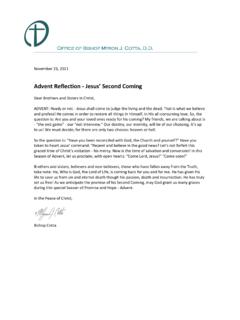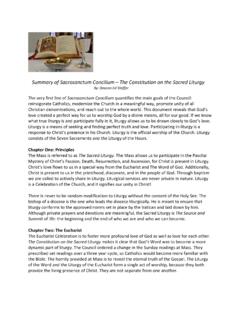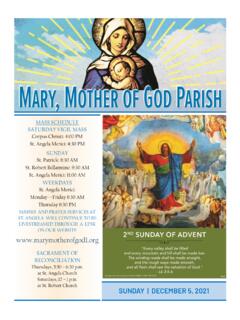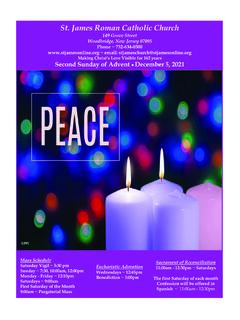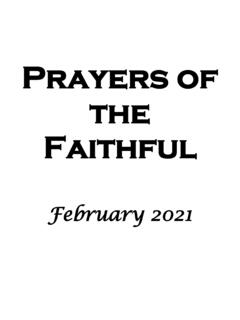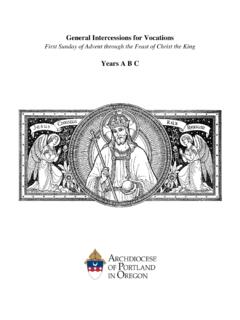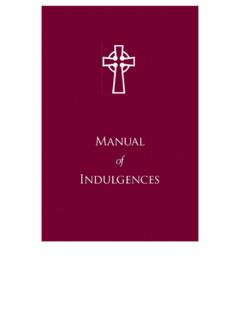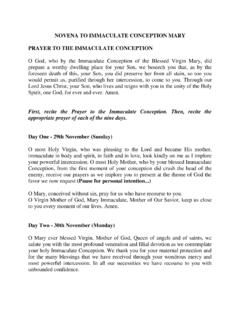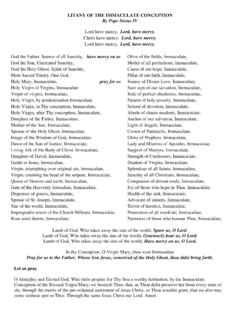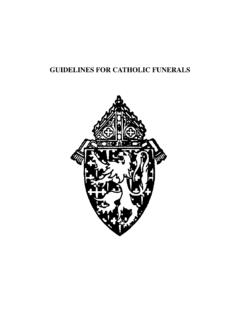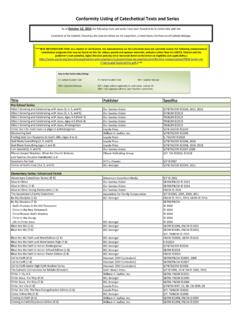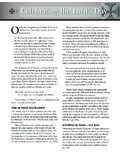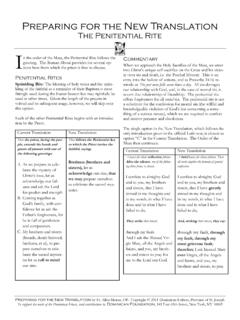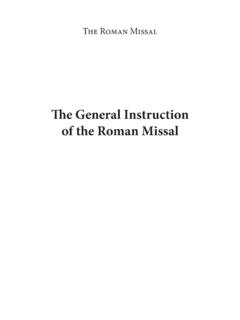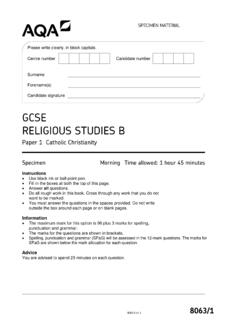Transcription of A CATHOLIC FUNERAL PLANNING GUIDE
1 A CATHOLIC FUNERAL . PLANNING GUIDE . 1. CONTENTS. Introduction ..3. Preliminary Decisions .. 4. Scheduling the Choosing a The FUNERAL Liturgy .. 5. The The FUNERAL The Making Selections .. 6. Liturgical Gifts of Bread and Words of Liturgical Readings .. 8. First Reading (Old Testament) ..8. First Reading (New Testament - during Easter Season only) ..12. Second Reading (New Testament)..13. Prayer of the Music Additional Information ..19. 2. INTRODUCTION. On behalf of the Portland Peninsula and Island Parishes, please accept our deepest sympathies on the occasion of the death of your loved one. During this difficult time, we want to assure you of our prayers and of our support.
2 It is our hope that the celebration of the FUNERAL rites of the Church will be a source of consolation for you and for your family. It can be challenging to plan for the FUNERAL of a loved one in the midst of personal grieving. Our parish staff is very sensitive to this, so please know that we are here to GUIDE and assist you through the PLANNING process. This booklet is designed to make the FUNERAL PLANNING process as simple as possible. All funerals in our parishes are celebrated according to the Order of Christian Funerals, one of the official ritual books of the CATHOLIC Church. While the FUNERAL does take place according to the structure of this Order, families and loved ones of the deceased are invited to be involved in making certain decisions about the FUNERAL liturgy, including selections of music, readings, and family participation.
3 We invite you to take some time to look through the various options available and to choose ones that reflect the faith, life, and personality of your departed loved one. You can indicate these choices on the FUNERAL Liturgy PLANNING Aid you will find inserted in this booklet. Please save this sheet and share it with us when one of our priests, deacons, or pastoral associates reaches out to you to discuss the FUNERAL liturgy in more detail. Again, know of our thoughts, our support, and our prayers both now and in the days ahead. Sincerely yours in Christ, The Clergy and Staff of the Portland Peninsula and Island Parishes 3.
4 PRELIMINARY DECISIONS. SCHEDULING THE FUNERAL . If you are working with a FUNERAL home, the FUNERAL director will be handling all of the FUNERAL arrangements on your behalf and will coordinate with our pastoral office to schedule the FUNERAL liturgy and the services of one of our priests. If you are not working with a FUNERAL home, please contact our office directly at (207) 773-7746 to make the necessary arrangements. CHOOSING A CEMETERY. While it is not a requirement, the Church encourages the burial of Catholics in CATHOLIC cemeteries. Throughout history, Christians have been buried near other Christians in places that have been blessed and dedicated for prayer and remembrance.
5 Burial in the consecrated ground of a CATHOLIC cemetery is a sign of our baptismal commitment and reaffirms that we remain brothers and sister of Christ, united even in death. In those circumstances when the deceased is buried or interred in a non- CATHOLIC cemetery, the priest will bless the site of burial. CREMATION. The Church earnestly recommends the burial of the bodies of the deceased as a sign of reverence for the human body and the Christian belief in the resurrection of the dead on the Last Day. The practice of cremation, however, can be permitted, provided that it has not been chosen for reasons contrary to CATHOLIC teaching.
6 If cremation is chosen, it is preferred that the FUNERAL liturgy be celebrated in the presence of the body of the deceased prior to its cremation. Following the liturgy, the body can then be cremated and the burial rites of the Church be celebrated afterwards. If cremation has already taken place before the FUNERAL liturgy, the FUNERAL can still be celebrated in the presence of the cremated remains. In keeping with our hope in the resurrection of the dead, the Church expects that cremated remains will be treated with the same respect given to the remains of a human body and thus be buried or interred in individual graves or columbaria.
7 The secular practices of scattering, dividing remains, or keeping them at home have no symbolic meaning in our tradition and are never permitted. 4. THE FUNERAL LITURGY. The Order of Christian Funerals foresees three distinct rites within the celebration of a FUNERAL : the Vigil (wake); the FUNERAL Liturgy itself (Mass or service); and the Rite of Committal (burial). THE VIGIL / WAKE. It is a long-standing CATHOLIC tradition for the family and friends of the deceased to gather the day or evening before the FUNERAL liturgy for a time of visitation, remembrance, and prayer. Ordinarily, the priest who will be celebrating the FUNERAL liturgy will meet with the immediate family before the start of the visiting hours in order to offer his support, to finalize any arrangements, and to lead those present in prayer.
8 While visiting hours are by no means required by the Church, they are certainly encouraged for the consoling effect they offer to the bereaved and for the opportunity they provide to the community to more appropriately share their condolences and support. THE FUNERAL LITURGY. It is the preference of the Church that the FUNERAL liturgy take place within the context of the celebration of Mass. Since the Eucharist is the source and summit of the Christian life, it is most appropriate that it be celebrated for the deceased at the completion of their earthly life and to commend them to eternal life. Schedule permitting, FUNERAL Masses in our parishes may be celebrated on any day of the week except Sundays, Holy Days of Obligation, and the days of the paschal Triduum (Holy Thursday, Good Friday, and Holy Saturday.)
9 Ordinarily FUNERAL Masses are celebrated at 10:00 AM. The FUNERAL liturgy outside of Mass can also be celebrated when the family determines, usually in consultation with one of our priests, that this form of liturgy would be more appropriate ( for fallen away Catholics, for the non- CATHOLIC spouse of a surviving CATHOLIC , etc.) This service is essentially a simple Liturgy of the Word without the consecration and distribution of the Eucharist, and it may be celebrated in the parish church, in the FUNERAL home, or at the cemetery. THE COMMITTAL. Usually the Rite of Committal takes place at the cemetery immediately following the FUNERAL liturgy.
10 It involves a few brief prayers as well as a chance for loved ones to offer some final words. In those cases when burial does not immediately follow the FUNERAL liturgy ( due to subsequent cremation, weather concerns, etc.), the priest will return with the family to celebrate the Rite of Committal at the agreed-upon time. 5. MAKING SELECTIONS. Using the FUNERAL Liturgy PLANNING Aid insert found in this booklet, you will be invited to make selections (if you wish) regarding the following: MUSIC. Because of the sacred nature of the Church's liturgy and its focus on the paschal mystery with its promise of salvation, the music sung at a FUNERAL liturgy should necessarily reflect our belief and hope in eternal life through Jesus Christ.
